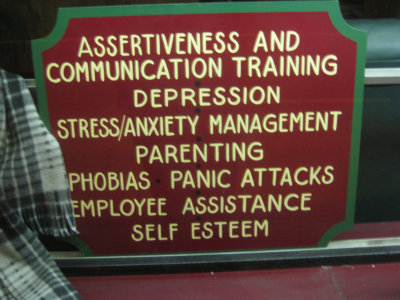Assertiveness Techniques: How to Become More Assertive
 Situations which involve confrontation or disagreement can be difficult for many individuals. In the heat of the moment many of us can agree to things we are not happy about, or even become angry and defensive at those who we believe are criticising us. These reactions are common, and being aggressive is often confused with being assertive. However, while both are styles of communication, being assertive is the ability to firmly (but calmly) voice our opinions and points of view. Communicating with others in this way can help prevent feelings of anger, inadequacy and low self-confidence which could otherwise lead to unhappiness and misery. Assertiveness techniques can help with this.
Situations which involve confrontation or disagreement can be difficult for many individuals. In the heat of the moment many of us can agree to things we are not happy about, or even become angry and defensive at those who we believe are criticising us. These reactions are common, and being aggressive is often confused with being assertive. However, while both are styles of communication, being assertive is the ability to firmly (but calmly) voice our opinions and points of view. Communicating with others in this way can help prevent feelings of anger, inadequacy and low self-confidence which could otherwise lead to unhappiness and misery. Assertiveness techniques can help with this.
Do you struggle to be assertive?
How can you know if this is your issue? Do you:
- become upset when others challenge your point of view?
- avoid situations where there is the possibility of confrontation; despite it meaning your needs will be overlooked?
- feel that by stating what you want you are being selfish?
- bend to others wishes only to soon regret it?
- say things in haste and regret them later?
- feel that your self-confidence is affected by how others treat you?
- feel your opinions and values are overlooked by those around you?
If you answered “yes” to any of these questions then being assertive with those around you may be an issue and for this we offer some straightforward assertiveness techniques.
Five Key Assertiveness Techniques to Try
So what can you do to be more assertive? The first step is to start thinking more assertively and then follow this by acting assertively. We all have an “internal list” of rules which are responsible for our behaviour and are supported by our thoughts. At times the thoughts we have may actually work against us, and this is when we must think assertively and challenge these thoughts by asking ourselves if they are helping us to put our views across.
For example, are you always trying to please everyone else around you in order to avoid sticky situations? This type of behaviour may be maintained by thoughts such as “If I do what they want, then they will not be mad at me,” or “I don’t want to lose their respect, so I must not challenge their views.” Questioning these types of negative thoughts and the perceived consequences will help to examine your “internal list” and allow you to test the validity of your thoughts. Ask yourself what would be the worse outcome of not going through with these beliefs? Remember, if your rules are working against you then change them! Other assertiveness techniques include:
Body Language
Be aware of your body posture. Are you fidgeting, giving enough eye contact, or appearing disinterested in the situation? We communicate though body language too, so remember how you stand or sit, the gestures you use, how you look at someone and your voice, all help convey how you see yourself in relation to the person you are talking to. If you are hunched and awkward, speak in a whisper and avoid eye contact, you are suggesting that the other person is more important than you are. If, on the other hand, you stand too close to someone and shout in their face, they are likely to feel you are being aggressive! Someone communicating assertively will stand or sit in an upright, relaxed way, establish eye contact and have an open expression.
Tone
Is your tone of voice appropriate? Are you speaking to loud or soft? Are you speaking clearly? You may want to practice speaking assertively by recording yourself and listening to how it sounds.Further, ‘I’ statements such as ‘I feel…’ ‘I think…’ ‘I would like…’ show that you are taking responsibility for your own feelings, rather than blaming someone else (eg ‘You make me feel…’) or taking responsibility for their feelings.
The Other Person
Recognize the other person’s point of view. This will let them know you are listening and concerned for what is happening, not just dismissing what they are saying. Alternatively, if the other person doesn’t seem to be listening, stick to your point. Repeat it calmly until you feel that you are being heard.
Practice
Learning to be more assertive takes practice. You can try out assertive responses in front of a mirror, or get a friend to give you feedback and suggestions. It’s also important to think about how the other person may react, and how you might cope with this
Remember, situations that involve conflict can be less difficult when one is assertive. Avoiding conflict can be emotionally unhealthy and cause a variety of problems. Working with a therapist to improve your assertive communication skills and practice assertiveness techniques can help to ensure your needs are heard and met more often.
If you would like help improving your communication skills and learn assertiveness techniques Harley Therapy’s team of experienced therapists would be happy to hear from you. They provide low-confidence counselling and anger management in London, in addition to a full range of psychotherapy and counselling solutions including cognitive behavioural therapy.




